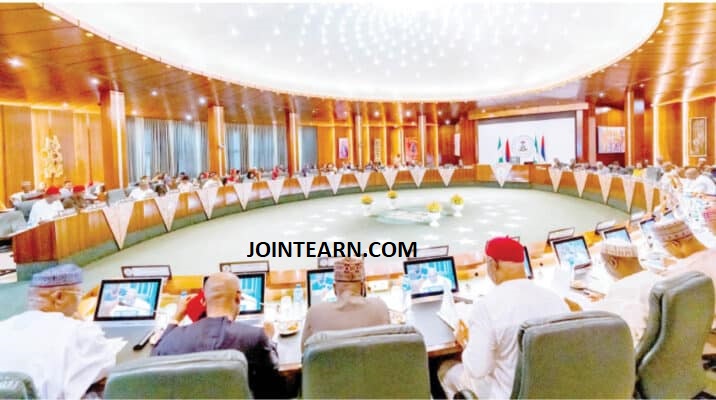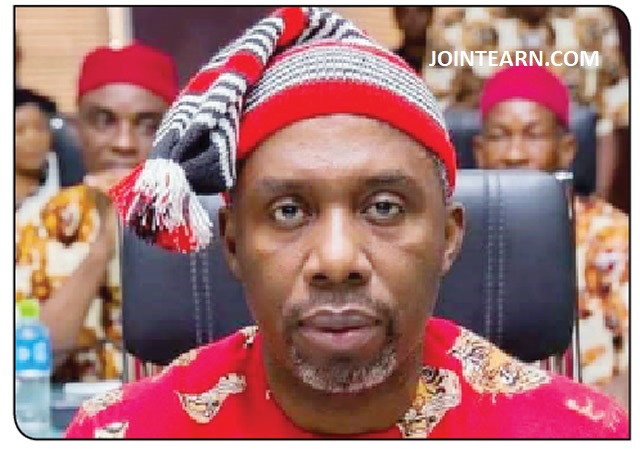Vice President Kashim Shettima on Thursday presided over a crucial meeting of the National Economic Council (NEC) in Abuja, where key issues bordering on food security, inflation, job creation, and the rising spate of insecurity were extensively deliberated. The meeting, attended by governors, deputy governors, and other high-ranking officials, marked another step in the Federal Government’s renewed drive to foster inclusive economic growth and respond to mounting public concerns.
Among those present were Governor Sheriff Oborevwori of Delta State, Governor Godwin Obaseki of Edo State (represented by Senator Monday Okpebholo), and several others from across Nigeria’s six geopolitical zones. The meeting took place at the Presidential Villa and was the first NEC gathering for some newly sworn-in acting governors and deputy governors following electoral transitions.
Shettima Calls for Unity, Urgency in Tackling Economic Woes
Vice President Shettima, in his opening remarks, called on governors to rally around the federal government in addressing Nigeria’s urgent socioeconomic challenges. He stressed that the time for partisanship was over and that cooperation across state and federal lines was key to delivering meaningful development.
“We are at a pivotal moment in our national life where collaboration must supersede partisanship,” Shettima said. “We must collectively confront inflation, insecurity, and unemployment. The Nigerian people are watching and expecting tangible results.”
He underscored the importance of policy alignment between federal and state governments to implement the Renewed Hope Agenda of President Bola Ahmed Tinubu, particularly in the areas of agriculture, energy, infrastructure, and health.
Food Security Tops Agenda
One of the major items on the NEC agenda was food security. With soaring food prices and increased hunger levels across many parts of the country, the Council deliberated on immediate and long-term solutions to tackle food scarcity and reduce inflation.
Several governors reported on the status of agricultural interventions in their states. There was a general consensus that more needed to be done to boost local food production, invest in mechanized farming, and combat insecurity in rural communities — a key barrier to farming.
Governor Oborevwori of Delta State highlighted the potential of the Niger Delta region in fishery and palm oil production, noting that targeted federal support could unlock immense agricultural value in the South-South region.
Senator Monday Okpebholo, representing Edo State, called for enhanced collaboration between the Ministry of Agriculture and state ministries to ensure that resources are adequately channeled toward smallholder farmers and agripreneurs.
The NEC resolved to establish a Food Security Implementation Task Force to work with states in ensuring accelerated cultivation of staple crops during the current planting season. States were also encouraged to submit their local agricultural priorities for integration into a national framework.
Tackling Inflation and Job Creation
In response to growing economic pressure on citizens, the Council discussed strategies to curb inflation and create sustainable employment opportunities. The Minister of Budget and Economic Planning presented the latest macroeconomic data, which showed a continued rise in the cost of living despite modest growth projections.
States were urged to accelerate youth-focused skills acquisition programs and entrepreneurship support schemes to reduce dependency and build a more resilient workforce.
Several governors also raised the need for states to attract more private investment through improved ease of doing business, digitization of government services, and public-private partnerships. A committee was set up to study successful state-led job creation models and recommend scalable initiatives for nationwide adoption.
Security: States Seek Greater Federal Support
Security was another dominant issue at the meeting, with governors expressing concern over the growing threat of banditry, kidnapping, and farmer-herder clashes. The governors called on the federal government to increase funding for state police outfits, vigilante groups, and community-based security programs.
Vice President Shettima assured the Council that the Federal Government was fully committed to strengthening national security. He emphasized the importance of intelligence sharing and synergy between the military, police, and local security networks.
The NEC resolved to organize a National Security Summit involving state governors, security chiefs, traditional rulers, and civil society organizations to chart a way forward in securing the nation more effectively.
Fiscal Matters and Revenue Sharing
The NEC also reviewed the status of the Federation Account and disbursements to states. The Accountant General of the Federation gave an update on monthly revenue allocations, noting improvements in oil receipts but warning of fluctuating non-oil revenues.
To improve internal revenue generation, states were encouraged to expand their tax nets without overburdening citizens or businesses. Discussions also touched on the need for better transparency in the use of local government funds and stronger financial discipline in managing state expenditures.
Health and Education Initiatives
Under social development matters, the NEC deliberated on boosting access to healthcare and education. The Council applauded the launch of the National School Feeding Programme and pledged state support to sustain and scale the initiative.
Governors shared updates on Universal Health Coverage implementation in their respective states. There were calls for the federal government to increase its support for primary healthcare centers, especially in underserved areas.
Conclusion: A United Front Against National Challenges
The NEC meeting ended on a note of unity, with a renewed commitment by governors and federal officials to work together for the benefit of all Nigerians. Vice President Shettima emphasized that while the road ahead remains tough, it is only through joint action that sustainable progress can be achieved.
“As leaders, we have no choice but to rise above our individual interests and deliver hope to our people. Let us not disappoint them,” Shettima concluded.
The Council agreed to reconvene in the coming weeks to assess progress on the key resolutions and finalize additional strategies to stabilize the economy and improve national well-being.












